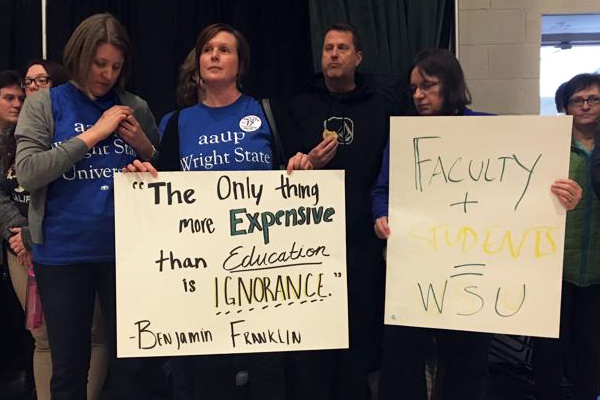
Excerpt from the Dayton Daily News
Wright State’s interim president announced an immediate reduction of non-personnel expenses on Friday.
In a message to the campus, interim president Curtis McCray announced the following cuts:
- All overnight travel must stop immediately unless funded by a third party, required by university policy, or subject to a collective bargaining agreement. If registrations or reservations have already occurred, they should be canceled and all efforts made to recoup any funds already expended. Local travel must be kept to an absolute minimum.
- No minor construction projects will be performed unless they have a safety need.
- Catering that is not funded by external parties is to end immediately.
- Reimbursements for local business meals will be discontinued. It is recognized that a few sanctioned activities, such as candidate interviews or recruiting activities, may be necessary. These should be kept to an absolute minimum.
- No personal memberships or dues will be paid or reimbursed.
- Supply purchases should be significantly reduced. Only those supplies absolutely necessary should be purchased.
- Do not replace items such as desktop and laptop computers or tablets until and unless they no longer work.
- No consulting agreements should be executed without a direct demonstrable revenue impact.
- 9. No purchases or replacements of furniture should be made.
- All university contracts must be used when acquiring goods or services, where such contracts exist.
- All cellphone allowances will be discontinued.
McCray and several other top officials said that “budget heads,” people in charge of different budgets within Wright State, should be punished for spending more than they’re supposed to.
“I think there are plenty of things we can do to punish budget heads to stay within budget,” McCray said.
The university’s board of trustees financial committee met this morning to discuss revenues and budget cuts.
The university has “no choice” but to move forward with cuts, said committee chairman Doug Fecher. He said feelings of anger and disgust toward the administration by some on campus is “all deserved.”
The cuts WSU is about to make should have been made in “small doses,” Fecher said, but since they were not they have to be made all at once, creating a larger impact at once.
“Still, the signs were there and leadership was lacking by not paying attention to the clouds on the horizon,” Fecher said.
Furloughs could be used for employees as a last resort to cut costs, said Jeff Ulliman, vice president for business and finance.
“We are not waiting until July 1 to pull the trigger on these things…I expect these things to begin no later than May,” Ulliman said.
Ulliman said the number of staff members cut will be far more than faculty members.
Fecher said he does not blame the students who were set to protest the meeting today. He urged the campus community to come together.
Official cuts are expected to be announced by the end of the month or early May, McCray has said. The university must cut $25 million from its upcoming budget while also boosting reserves by $5 million.
McCray has said layoffs and salary reductions are likely and it’s possible some athletics programs, such as the golf team, could get cut.
Protest organizers say between 80 and 100 students took part in a protest before the meeting, holding signs in the back of the room saying things such as “Release the Audit” and “Cut Administration Not Education.”
Max Carone, a student protest organizer and mechanical engineering sophomore, said one of the main things they are demanding from administration is the release of a state audit the school paid more than $300,000 for but previously refused to made public.
“That will show us exactly where our money is being spent. It was funded by our dollars and taxpayer dollars so we damn right have a right to know where our money is being spent as a university, help clear up some transparency issues,” he said. “And the biggest thing we want to convey right now during this budget and finance meeting is just remind them to put education first.”

